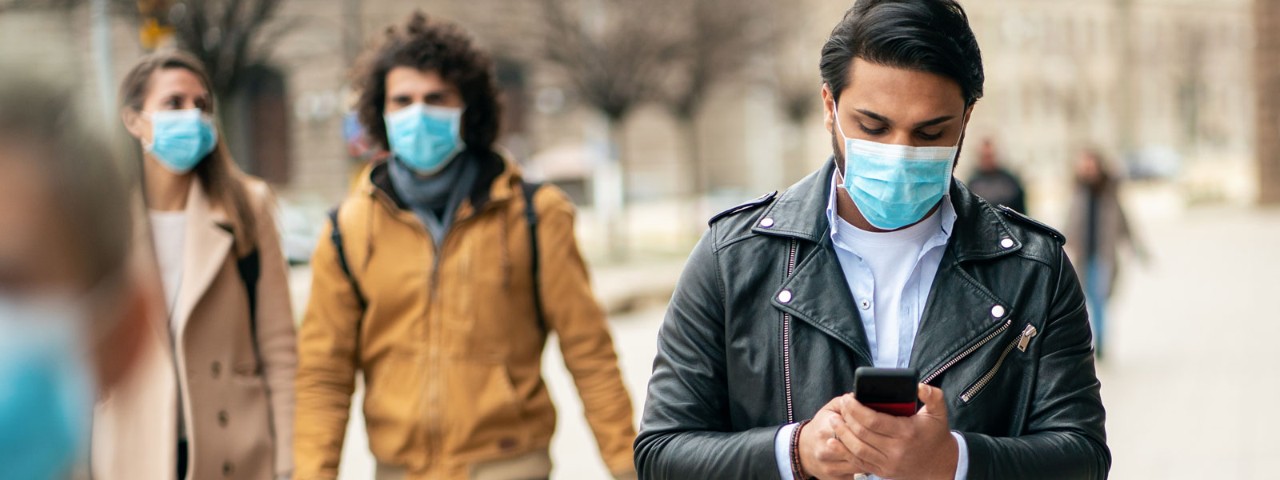The special relationship is alive and well in the COVID-19 outbreak. The US and UK share strikingly similar opinions about data-sharing to combat the pandemic, according to a six-nation survey by the Oliver Wyman Forum. The two countries also share deep connections between their research, business and startup communities that are spurring the use of similar tools to study and contain the spread of the virus - and potentially facilitate the reopening of their economies.
Our survey of people in the US, UK, Germany, Spain, Australia, and Singapore found that American and British respondents consistently expressed common views about data-sharing. By nearly identical margins, most would share the results of a positive COVID-19 test with a doctor or public health authority, but far fewer would do so with government officials, employers, or public apps tracking the infection. Looking just at the numbers, you would be hard-pressed to say which country had a socialized healthcare system and which did not.
The similarities are hardly surprising. The US and UK share a common history and some of the closest links of any two countries in the world. The UK bequeathed its traditions of common law, limited government and individual liberty to its former American colonies. London and New York are symbiotic media and financial capitals, and Brits are as common in the Hollywood Hills and Silicon Valley’s Sand Hill Road as Yanks are in the City of London.
Faced with sharply rising numbers of infections and fatalities, both countries are stepping up their mobilization against the virus. Close ties between UK and US academic communities are fostering the adoption of apps designed to help containment efforts. Researchers from King’s College London and Guy’s and St. Thomas’ Hospitals recently teamed up to launch a COVID Symptom Tracker. It is based on an app developed by a UK epidemiologist and data scientists in London and Boston to study nutrition in twins. Users, who opt in to participate, supply basic information like age, gender, weight, and any pre-existing health conditions, and then report daily any symptoms that could be associated with COVID-19, such as fever or persistent cough.
The app was downloaded more than a million times within days of its launch in the UK. The app’s developers teamed up with researchers at the Massachusetts General Hospital and Stanford Medical to launch an American version at the end of March. New York City’s Mount Sinai Health System launched its own COVID tracker at the start of April to gather similar information from its patients as well as city residents generally on a voluntary basis. New York City has introduced its own portal for residents to self-report COVID-19 symptoms, positive tests or close contact with infected persons, to help the city focus its containment efforts.
These efforts all come from healthcare providers or local governments, and they rely on individuals agreeing voluntarily to share their data. That’s crucial because our survey found that Americans and Britons feel much more comfortable sharing data with those types of institutions than with apps or private companies. (UK respondents favored national over local officials, which may reflect the smaller role that local authorities play in that country.)
Data-sharing initiatives seem certain to proliferate if we want to contain the pandemic and get society back to work, including ones that go beyond self-reporting symptoms. Researchers at MIT recently launched an app that sends a mobile alert to people if they come in close contact with an infected person. The UK’s National Health Service is working with developers on a similar Bluetooth-based mobile alert app. These apps are similar to Singapore’s TraceTogether, and an app that German officials are developing with research institutions. Preliminary efforts also are underway in both the UK and US to certify people who can go back to a normal working environment because they have recovered and have antibodies to the virus.
These tools will be new to most Americans and Britons, even if they stop well short of some of the sweeping data monitoring that China employed in its containment effort Yet public opinion can change rapidly in a crisis. It took only six weeks after the September 11, 2001 attacks on New York and Washington, D.C., for the US to pass the Patriot Act, which among other things gave law enforcement greater leeway to search telephone and e-mail traffic without a court order. The law’s reach generated controversy for years, and Congress moved in 2015 to curtail the National Security Agency’s collection of telephone data.
Policymakers would do well to remember that lesson today. Many top CEOs are privately warning of economic catastrophe if steps aren’t taken to enable a prompt, and likely phased, return to work. How we get there will require many more national conversations about everything from increased testing and guidance on the public use of masks and gloves to possible self-reported or government-driven tracking.
Such measures would be a departure from traditional practice in both the US and UK. Data-sharing methods that are transparent, require the buy-in of users, and are focused directly at the effort to fight the pandemic are most likely to win and sustain public acceptance. Interventions should be designed to deliver the future economy and society we want, not just the one we had before the coronavirus.

